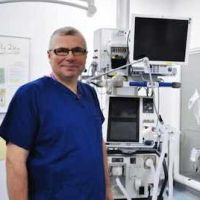A study by researchers from D'Or Institute for Research and Education (IDOR) in Brazil has analysed the factors associated with severe pneumonia in hospitalised cancer patients and suggests that more personalised treatment protocols can reduce mortality in these patients. The findings are published online in PLoS ONE.
It is widely believed that the majority of pneumonia cases in cancer patients are due to immune system debility caused by the disease and to exposure to multiresistant bacteria which can cause the pulmonary infection. The idea is that these patients are more vulnerable to superbacteria because they spend a lot of time in hospitals.
However, results of the IDOR study point to a different scenario. Analysis of medical data from 325 cancer patients hospitalised with pneumonia in three large hospitals revealed a low rate of multiresistant pathogens — less than 14 percent of the patients showed an infection of this kind.
The results suggest that the presence of multiresistant bacteria is not so important to explain the pneumonia development in this group of patients. "In our daily experience in the medical clinic we already had this perception and our study came to prove it", according to IDOR researcher Jorge Salluh, MD. "The severity of illness and organ dysfunction seems to be the best predictors of outcome in this population."
The findings can lead to the development of safer and more effective methods to treat patients and lower the mortality of people with cancer and pneumonia. Given the common belief that multiresistant pathogens have a big role in the development of pneumonia in cancer patients, today's treatment for this population is an standardised antibiotic therapy. "We give to the patients two or three broad-spectrum antibiotics which act against a wide range of multiresistant bacteria", explains Dr. Salluh. "However, the reality is that the incidence of bacteria varies according to the region of the globe and not all cancer patients with pneumonia are affected by superbacteria."
The broad-spectrum antibiotic therapy is the first choice of physicians because the result from tests that are routinely used for pathogen detection can take 72 hours. Without having this much time to wait before taking an action, physicians opt for the broad-spectrum treatment.
However, this approach can lead to side effects and induce bacterial resistance to antibiotics. To address this problem, the Brazilian researchers are studying new treatment protocols. One option is to test faster methods of pathogen detection which can offer a result in six hours.
Another plan is to conduct a broader study with more patients to develop models to identify patients at high risk for multiresistant bacteria infection. With these models it would be possible to discriminate patients at risk and give them the proper treatment. "Our goal is know how to choose the treatment that is more appropriate for each patient", Dr. Salluh points out.
Source: D'Or Institute for Research and Education
Image Credit: Institute for Creation Research
It is widely believed that the majority of pneumonia cases in cancer patients are due to immune system debility caused by the disease and to exposure to multiresistant bacteria which can cause the pulmonary infection. The idea is that these patients are more vulnerable to superbacteria because they spend a lot of time in hospitals.
However, results of the IDOR study point to a different scenario. Analysis of medical data from 325 cancer patients hospitalised with pneumonia in three large hospitals revealed a low rate of multiresistant pathogens — less than 14 percent of the patients showed an infection of this kind.
The results suggest that the presence of multiresistant bacteria is not so important to explain the pneumonia development in this group of patients. "In our daily experience in the medical clinic we already had this perception and our study came to prove it", according to IDOR researcher Jorge Salluh, MD. "The severity of illness and organ dysfunction seems to be the best predictors of outcome in this population."
The findings can lead to the development of safer and more effective methods to treat patients and lower the mortality of people with cancer and pneumonia. Given the common belief that multiresistant pathogens have a big role in the development of pneumonia in cancer patients, today's treatment for this population is an standardised antibiotic therapy. "We give to the patients two or three broad-spectrum antibiotics which act against a wide range of multiresistant bacteria", explains Dr. Salluh. "However, the reality is that the incidence of bacteria varies according to the region of the globe and not all cancer patients with pneumonia are affected by superbacteria."
The broad-spectrum antibiotic therapy is the first choice of physicians because the result from tests that are routinely used for pathogen detection can take 72 hours. Without having this much time to wait before taking an action, physicians opt for the broad-spectrum treatment.
However, this approach can lead to side effects and induce bacterial resistance to antibiotics. To address this problem, the Brazilian researchers are studying new treatment protocols. One option is to test faster methods of pathogen detection which can offer a result in six hours.
Another plan is to conduct a broader study with more patients to develop models to identify patients at high risk for multiresistant bacteria infection. With these models it would be possible to discriminate patients at risk and give them the proper treatment. "Our goal is know how to choose the treatment that is more appropriate for each patient", Dr. Salluh points out.
Source: D'Or Institute for Research and Education
Image Credit: Institute for Creation Research
References:
Rabello LSCF, Silva JRL, Azevedo LCP, Souza I, Salluh JIF, et al. (2015)
Clinical outcomes and microbiological characteristics of severe pneumonia in cancer patients: a prospective cohort study. PLoS ONE
10(3): e0120544. doi:10.1371/journal.pone.0120544
Latest Articles
Cancer, Pneumonia, antibiotic resistance, antibiotics, superbacteria
A study by researchers from D'Or Institute for Research and Education (IDOR) in Brazil has analysed the factors associated with severe pneumonia in hospita...



























